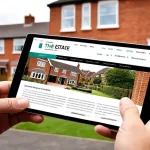Emerging Technology Trends in Real Estate
The real estate sector is witnessing significant disruption through emerging technologies that enhance efficiency and user experience. Among these, artificial intelligence (AI) and machine learning stand out by enabling predictive analytics for property valuation and personalized recommendations. These tools help buyers and sellers make more informed decisions, streamlining transactions in ways previously not possible.
Another transformative innovation is blockchain, which introduces secure, transparent, and tamper-proof property records. This technology simplifies title transfers and reduces fraud risk, reshaping how ownership verification is conducted across the industry. Additionally, virtual and augmented reality are becoming common for property tours, allowing potential buyers to explore listings remotely, saving time and expanding market reach.
Topic to read : How Can Changes in Property Value Affect Your Financial Strategy?
Adoption rates of such real estate technology vary but are accelerating quickly, as reported by industry experts. Property managers leverage smart building systems to optimize energy use and maintenance, while brokers use digital platforms to boost client engagement and data management. The result is a transformation touching every stage of the property lifecycle—from buying and selling to ongoing management—making the entire process more transparent, efficient, and customer-friendly.
Artificial Intelligence: Automating and Personalising Real Estate
Artificial intelligence in real estate is revolutionizing how properties are managed and marketed. Through AI automation, tasks once time-consuming—like property valuation—have become quicker and more accurate. Predictive analytics powered by AI analyze market trends and buyer behavior, enabling smarter investment decisions and tailored customer experiences.
Also to discover : How Does Investing in Real Estate Affect the UK Financial Landscape?
Smart property management benefits significantly from AI algorithms that monitor maintenance needs and optimize energy use, reducing costs and increasing efficiency. Virtual assistants enhance customer interaction by answering queries instantly and scheduling viewings, streamlining communication without sacrificing personal touch.
Personalisation in property recommendations is another powerful advantage. AI uses data on a buyer’s preferences and search history to suggest options that closely match what they want. This targeted marketing strategy improves the chances of finding the right home faster while reducing overwhelm for buyers. As AI continues evolving, it increasingly merges automation with a human-centric approach—making real estate transactions both smarter and more engaging.
Smart Homes and Internet of Things Integration
Smart homes, empowered by real estate IoT, are transforming modern living through home automation systems that enhance efficiency and security. Connected devices, such as smart thermostats, lighting controls, and security cameras, work seamlessly to optimize energy use while providing homeowners with greater convenience. For example, a smart thermostat can learn your schedule and adjust temperatures automatically, reducing energy consumption without sacrificing comfort.
One of the major advantages of home automation is remote control capability. Through a smartphone app, users can monitor security cameras, lock doors, or adjust lighting from anywhere, offering peace of mind and real-time management. This continuous connectivity allows for proactive responses to potential issues, such as alerts for water leaks or unauthorized entry, boosting overall home safety.
In real estate, properties equipped with robust IoT systems often command higher market values. Buyers increasingly expect smart home features as standard, seeing them as long-term investments in comfort, utility savings, and security. Therefore, integrating smart homes into real estate IoT not only modernizes living spaces but also enhances property appeal and competitiveness in the market.
Virtual Reality and Augmented Reality for Property Exploration
Explore properties like never before with virtual reality real estate and augmented reality technologies. Virtual property tours offer immersive experiences that let buyers and renters walk through spaces without leaving their homes. This technology provides realistic visuals and a sense of scale, helping users gauge room sizes and layouts more accurately than photos alone.
Augmented reality enhances this experience by allowing users to visualise renovations or staging in real-time. Imagine pointing a smartphone or tablet at an empty room and seeing furniture or design changes overlaid onto the actual environment. This makes it easier to imagine a property’s potential, helping buyers make informed decisions quickly.
Both virtual tours and AR save significant time by reducing the number of physical visits needed. Sellers and agents can also reach a broader audience, including out-of-town buyers or those with tight schedules. The combined use of these technologies makes property exploration more efficient, engaging, and accessible, revolutionising the way real estate transactions begin.
Blockchain and Secure Real Estate Transactions
Blockchain real estate technology is revolutionizing how property deals are conducted. By utilizing blockchain, transactions become inherently more secure and transparent. This is because every transaction is recorded on an immutable ledger, which significantly reduces the chances of fraud and tampering.
A key feature enabling secure transactions in real estate is the use of smart contracts. These self-executing contracts automatically enforce terms once predefined conditions are met, such as releasing payment when property ownership is transferred. This automation minimizes delays and human errors, streamlining the buying and selling process.
Moreover, blockchain improves title management by providing a reliable, unchangeable record of ownership history. This helps verify property titles quickly and unequivocally, addressing common concerns regarding disputes or ambiguous ownership claims.
Overall, the combination of blockchain real estate systems and smart contracts fosters transparency while enhancing security. Buyers and sellers can trust that their transactions are verifiable and protected from fraudulent activity, which is a vital advancement in making secure transactions accessible and efficient.
Big Data and Analytics: Driving Informed Decision-Making
Big data real estate is transforming how industry professionals make decisions. By harnessing property data analytics, firms gain critical market insights that go beyond traditional methods. For example, analysing buyer behaviour and market trends reveals patterns that guide pricing strategies and marketing efforts with pinpoint accuracy.
These datasets include transaction histories, demographic details, and even online search trends. Using advanced analytics, real estate investors can forecast potential returns more reliably, improving decision-making while managing risks effectively. Data-driven investment forecasting helps anticipate market shifts before they occur, reducing uncertainty.
Moreover, property valuations benefit significantly from integrating multiple data layers such as location, economic factors, and recent sales. Enhancing valuations with such a comprehensive approach ensures prices reflect true market conditions. In this way, big data real estate empowers stakeholders to make faster, smarter, and more confident decisions in an otherwise complex market landscape.
Expert Perspectives and Industry Case Studies
Delving into real-world success and foresight
Industry experts emphasize the transformative impact of real estate innovation case studies in shaping market dynamics. For example, a leading property management firm integrated AI-driven analytics to optimize leasing processes, significantly reducing vacancy times. This technology adoption example demonstrates practical benefits including enhanced decision-making and improved tenant satisfaction.
Several professionals highlight that successful innovation requires not just technology but also alignment with user needs. Insights from pace-setting executives reveal that embracing innovation often starts with small, manageable pilot projects before full-scale implementation. These pilots provide valuable feedback loops, enabling refinements and risk mitigation.
Lessons learned from such real estate innovation case studies include the importance of seamless integration with legacy systems and fostering a culture receptive to change. Experts predict that future trends will focus on augmented reality for virtual tours and blockchain for secure transactions, enhancing transparency and client trust.
These expert insights inspire stakeholders to actively explore cutting-edge solutions, armed with confidence drawn from proven outcomes and thoughtful strategies in real estate technology adoption.

